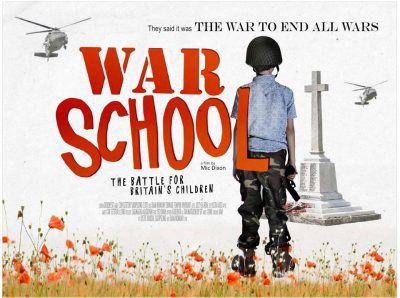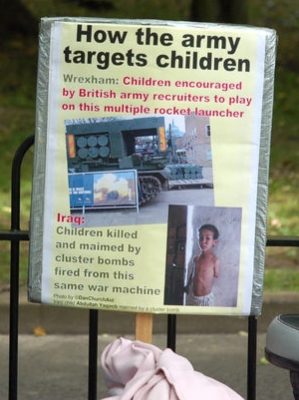Local communities taking action
In June 2014, North Wales Armed Forces Day was held in Wrexham. Wrexham Peace and Justice Forum were concerned that they were being asked to ‘celebrate’ and ‘thank’ the Armed Forces ‘without any critical analysis of the recent conflicts they have been involved in’ and that the event would be used for recruitment, particularly aimed at children. Read more.
Members of Leicester for Peace/Leicester Against War and Civic Leicester have grown concerned in recent years about the presence of Army recruiting stalls in Leicester city centre and with young children encouraged to handle weapons and sit in and play on military vehicles. Read more.
Local Quakers in Chester grew concerned about the Armed Forces bringing weapons into the town centre, and children being allowed to play with them, at recruitment events such as ‘Reserves Day’ or at times not particularity coinciding with an event. Read more.

 Several groups have organised vigils for peace to coincide with public military events. Others have organised film showings, for example showing the film
Several groups have organised vigils for peace to coincide with public military events. Others have organised film showings, for example showing the film  They coordinated an open letter to Wrexham County Borough Council, which was signed by over 100 people and organisations. The letter protested against the council’s promotion, sponsorship and funding of Armed Forces Day, and specifically the use of a picture of a toddler in military gear to advertise it. It highlighted the terrible effects of war, the inappropriateness of presenting it as entertainment, and the dangers of the recruiting messages at the event. It also raised concerns that the North Wales Armed Forces Day Ambassador (a young veteran) had recommended that under-18s should sign up for the forces.
They coordinated an open letter to Wrexham County Borough Council, which was signed by over 100 people and organisations. The letter protested against the council’s promotion, sponsorship and funding of Armed Forces Day, and specifically the use of a picture of a toddler in military gear to advertise it. It highlighted the terrible effects of war, the inappropriateness of presenting it as entertainment, and the dangers of the recruiting messages at the event. It also raised concerns that the North Wales Armed Forces Day Ambassador (a young veteran) had recommended that under-18s should sign up for the forces.